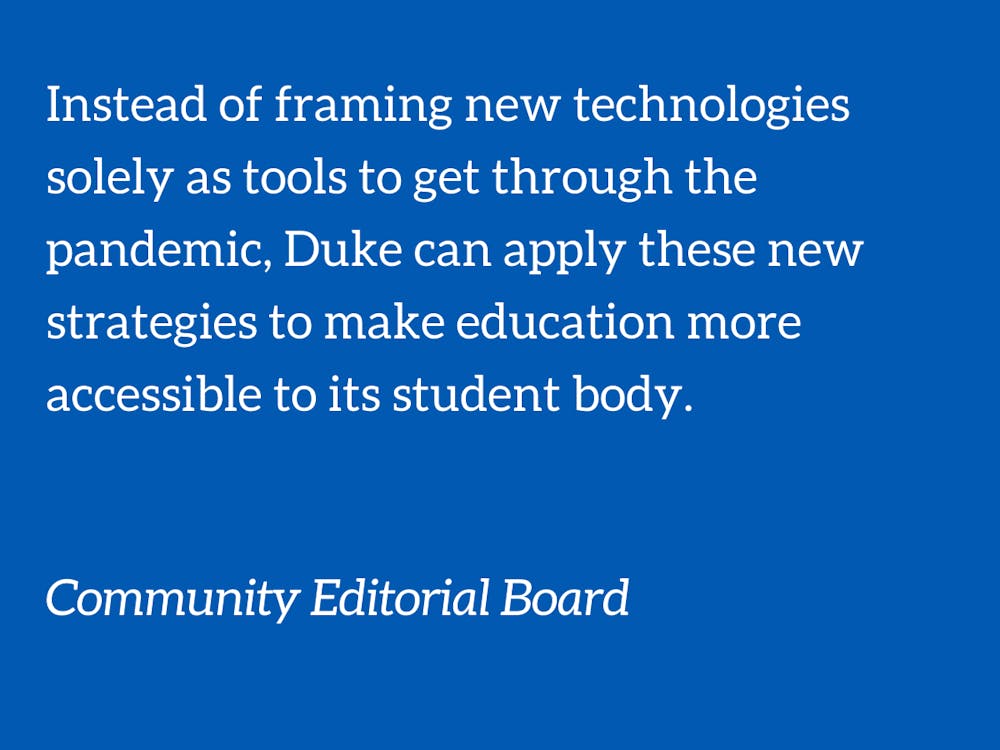To many, Duke’s stagnation regarding an evolving pandemic is concerning. As new variants emerge, COVID-19 protocols regarding masking policy and asymptomatic testing remain largely unchanged. Furthermore, Duke has not comprehensively introduced virtual accommodations for students who must miss class for health conditions other than COVID-19—accommodations that Duke clearly developed during the pandemic. This discrepancy reveals that Duke does not have adequate accommodative measures for students who must miss class on the basis of personal health conditions, which students have dealt with even before the pandemic. All professors learned how to use new resources, such as Zoom, as a result of pandemic instruction changes. Therefore, Duke now has the opportunity to ameliorate its student health accommodations by expanding its new technological infrastructure.
While Duke continues to require students who contract COVID-19 to isolate, professors are not required to provide online options for attendance for these students. If classes are not recorded, quarantined students must miss days of instruction without an opportunity to make this up. As a school that prides itself on its rigorous academics, missing even a few days of class material can be detrimental and can cause students to fall behind at no fault of their own.
Instead, many professors simply refer students to their peers’ class notes. However, the academic burden of COVID-19 should not fall squarely upon the shoulders of students. Why are professors allowed to be less flexible with regards to the pandemic than students? Given that Duke has requested that students come to campus and take courses amidst rising case numbers, the administration should provide systematic accommodations for those who do test positive. Duke must mandate that professors create avenues for COVID-positive students to compensate for missed class time through synchronous or asynchronous means.
Furthermore, Duke’s stance on COVID-19 should extend far beyond the limits of this pandemic. The resources that helped the university function during the pandemic can—and should—be used to maximize access to academic resources to those who face personal health issues. By building upon the student health infrastructure created during the pandemic, Duke can create a more equitable learning experience for a post-pandemic world.
The holes in Duke’s COVID-19 student health protocols have highlighted the inadequacy of Duke’s personal student health protocols. Duke has not done enough for students who must miss in-class instruction for health reasons, such as for chronic illnesses. Currently, Duke refers chronically ill students to their academic deans, who are not always equipped to handle personal student health concerns. While these professionals have experience mentoring students, they are not medical experts; in other words, they lack the fundamental knowledge required to address specific health concerns. Thus, students who face personal health difficulties do not have adequate support at Duke, which puts them, as well as their professors and deans, in difficult positions.
With a limit of three short-term incapacitation forms per semester—with each form valid for only one missed class—and a lack of recorded classes, it is indubitably—and perhaps unfairly—difficult to catch up on missed lectures. Duke should continue to offer online class options for those who cannot attend class. While the option to attend class online or watch recorded lectures may tempt students to skip in-person instruction, professors can encourage attendance in other ways, such as through attendance-recording apps that accept excused absences. Professors could also offer this virtual format on a case-by-case basis, eliminating the opportunity for students to abuse this option. Regardless, Duke must revise its student health protocols and encourage professors to take advantage of technologies developed during the pandemic to better promote student learning.
Aside from ensuring that class lectures are more accessible to students, virtual options can also improve students’ comprehension of material. For instance, the opportunity to rewatch class at a slower speed provides ample time to pause and process new information for students with processing disorders. In this way, students with ADHD can mitigate the distractions that arise from in-person class by supplementing their attendance with virtual lectures. Finally, the ability to rewatch lectures can also help students more effectively prepare for exams by making class material more accessible.
Duke can, and should, make use of the new virtual options developed during the pandemic and outline a clear policy requiring professors to accommodate chronically ill students. For instance, Duke could require that professors record classes for students who must miss class for health reasons. Duke can also ask professors to provide virtual ways of making up for missed participation, such as through written reflections based on class material. Most importantly, Duke should listen to chronically ill students, academic deans, professors, and medical professionals to design a fair, comprehensive and coherent student health policy.
At Duke, attendance is often vital to success. Thus, the lack of clear policy concerning attendance options for those incapacitated by COVID-19 or chronic illnesses places these students at an inherent disadvantage––one which is often outside of their control. Instead of framing new technologies solely as tools to get through the pandemic, Duke can apply these new strategies to make education more accessible to its student body. This is how Duke can fulfill its stated mission to educate future leaders.
The Community Editorial Board is independent from the editorial staff of the Chronicle. Their column usually runs on Tuesdays.
Get The Chronicle straight to your inbox
Signup for our weekly newsletter. Cancel at any time.

